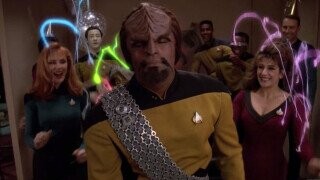A Terrible Dad Taught His Son Only Klingon

We asked readers to pick between Star Trek and Star Wars. Said Wei-Hwa H., "I'm definitely choosing the one which got re-envisioned by J. J. Abrams with a fresh new movie full of potential, only to follow it up four years later with a sequel movie that squandered all that potential and made a big storytelling mess that went nowhere." We think we all know which one he's talking about.
Veronica M. answered by showing off two tattoos of Federation logos (we're just messing with her; we know they're Order and Empire symbols). One of the more surprising answers came from Zach C., who said "Everything that happens in Star Trek is due to people being bored." Since it's a post-scarcity society, "Their entire motivation is to learn more and/or be entertained. Star Trek is the sci-fi equivalent of a girl picking a fight with her boyfriend because she can't think of anything better to do." That same premise is why Daniel L. prefers Star Trek: "It gives me hope for a peaceful future, one where humans continue to search for meaning and understanding of the world and universe around them."
In fact, our readers seem to be living out that conflict-free future: Everyone stated their opinions civilly instead of attacking each other, and a great many people simply answered "Why not both?" The only testy exchange came when one reader said "star trek is way to nerdy," leading to an argument over grammar and finally this line from Ray J.: "What's the purpose of a shared language? Except Klingon, that's just to ensure eternal virginity."
Don't Miss
Klingon has some potential uses, however. This fictional language might teach us about how language works in general. So thought d'Armond Speers, who in 1996 was pursuing a doctorate in linguistics from Georgetown University.
Speers had a toddler son, who was ready to learn to speak, like most kids his age. Speers decided to speak to his on Alec only in Klingon. His wife, meanwhile, spoke to Alec only in English, either because this was one of the experiment's parameters or because she wanted no part in this nonsense.
The boy would grow up bilingual in English and Klingon, supposed Speers, just like all children who hear two languages growing up. If so, this would prove the made-up languages are just as legitimate as real ones (all languages are made up, after all).
What actually happened was that the boy gravitated away from Klingon and spoke only English by the time he was three, no matter what kind of guttural grunts Speers sent his way. Whether or not "made-up" languages are as legitimate as "real" ones, Klingon is not as legitimate as English. It has only around 2,000 words, which was enough for every line of Klingon dialogue in Star Trek but much fewer than any naturally evolved language. English, meanwhile, is an especially wordy language, with some 350,000 words, and that's leaving out all the weird ones.
Star Trek fans have since expanded Klingon just a little, but at the time of the experiment, Klingon had no word for (for example) "bottle," "diaper," or "table." if you have to turn to one language every time you have to refer to most things, the other language doesn’t stand a chance.
It's Star Trek week at Cracked! Want more like this, straight from your email inbox, without any ads or popups? Join the One Cracked Fact newsletter:
For more language weirdness, check out:
When Hollywood Needs A Made-Up Language, They Come To Us
5 Complex Languages Invented by One (Crazy) Person
There's a Hidden Language in Futurama
Follow Ryan Menezes on Twitter for more stuff no one should see.
Top image: Paramount
